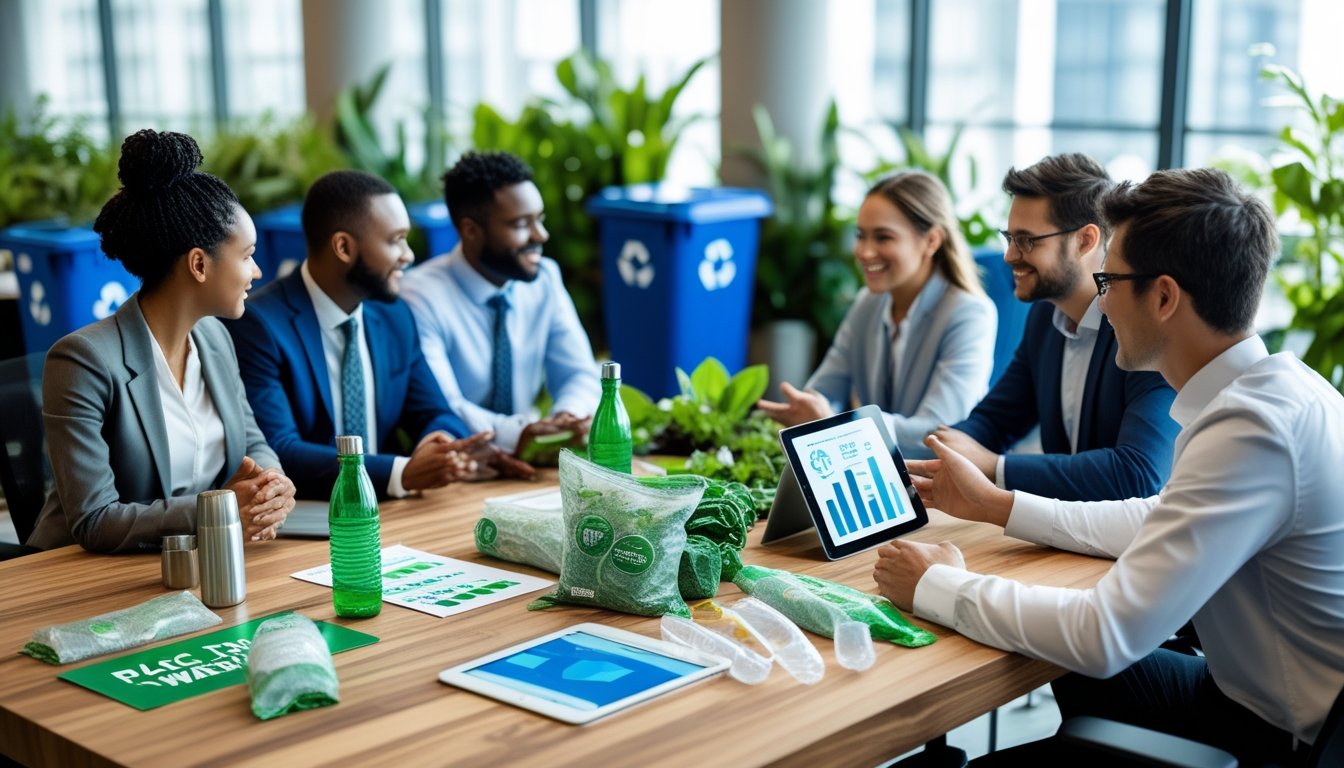Late updated: 14 Nov 2025 15:11
Written by: Amber Collins
Innovative Approaches To Reduce Business Plastic Waste: Effective Strategies For Sustainability
Reducing plastic waste is a critical issue for businesses worldwide as environmental concerns continue to rise. Our responsibility is to seek out innovative approaches that not only reduce our plastic footprint but also contribute positively to sustainability. Incorporating innovative strategies such as partnerships in ocean clean-up, investing in robust recycling infrastructure, and exploring cutting-edge material alternatives are vital steps businesses can take to mitigate plastic waste.

The pressure to cut down on plastic waste is more pressing than ever due to the ongoing plastic waste crisis. Companies are increasingly turning to technology and sustainable economic models to creatively address the challenges. These advances are not just about minimising waste; they can also open up new business opportunities in line with the principles of a circular economy.
In addition to technological solutions, collaboration across industries and communities can drive significant progress. By sharing knowledge and developing joint initiatives, businesses can achieve greater impact in reducing their plastic footprint. Tackling plastic waste effectively demands an approach where innovation and collaboration intersect to foster a sustainable future.
Key Takeaways
- Innovative strategies can successfully reduce business plastic waste.
- Collaborative efforts enhance the impact of sustainability initiatives.
- A focus on new technologies and materials is essential for future solutions.
Innovative Strategies for Business Plastic Waste Reduction
We explore several key strategies that businesses can adopt to effectively reduce their plastic waste. These approaches focus on innovative packaging solutions, advanced recycling technologies, circular economic models, and extended producer responsibility mechanisms.
Reinventing Plastic Packaging for Sustainability
A significant step in reducing plastic waste is rethinking plastic packaging. Traditional packaging often relies on single-use plastics that contribute heavily to waste. Biodegradable plastics and compostable materials are gaining traction as more sustainable alternatives. Businesses can also utilise minimalist designs that reduce material use.
Brands adopting innovative packaging designs can minimise their plastic footprint. For instance, reusable systems, where consumers return packaging for refilling, can drastically cut down single-use plastic consumption. These solutions align with consumer preferences for eco-friendly products and can bolster a company’s sustainability credentials.
Cutting-Edge Technologies in Recycling and Upcycling
Advanced recycling technologies offer promising solutions to plastic waste. Chemical recycling processes, like pyrolysis and depolymerization, break down plastics into their monomers for reuse in manufacturing. These methods complement traditional recycling by handling complex material types.
We can harness technology for plastic-to-product upcycling. This approach repurposes plastic waste into new, value-added products. By investing in sustainable waste management systems, businesses enhance both their environmental impact and their brand reputation, fostering customer loyalty.
Adopting Circular Economy and Closed-Loop Systems
The circular economy model is crucial for sustainable business operations. Unlike traditional linear models that focus on take-make-dispose, circular economies encourage the reuse of materials. Closed-loop systems ensure materials are constantly cycled within the production process.
Implementing closed-loop initiatives can significantly reduce plastic waste. These systems demand a paradigm shift in how we design products and select materials, prioritising those that can be easily recovered or regenerated. Companies can transform waste products into valuable resources, reducing the need for fresh plastic production.
Implementing Extended Producer Responsibility Programmes
Extended Producer Responsibility (EPR) programmes hold producers accountable for the end-of-life management of their products. By making manufacturers responsible for their packaging waste, these programmes incentivise the development of sustainable designs.
EPR can lead to innovations in waste collection, recycling, and eco-design, making it an essential tool for plastic waste reduction. Businesses implementing EPR schemes often benefit from improved corporate responsibility profiles and a competitive edge in the increasingly eco-conscious market. Integrating EPR into company policies showcases a commitment to sustainability and care for our shared environment.
Collaborative Solutions and Future Innovations

Our focus on reducing plastic waste in business involves strengthening supply chains, engaging communities, and utilising technology. These strategies enable businesses to tackle plastic pollution effectively and pave the way for a more sustainable future.
Strengthening the Supply Chain to Reduce Plastic Pollution
One of the pillars of reducing plastic waste is enhancing supply chain practices. By collaborating with suppliers, businesses can prioritise sustainable materials. This can include biodegradable plastics or materials with lower environmental impact.
We can also implement robust waste management systems that track and optimise the lifecycle of plastic products. These systems help us minimise waste at each stage of production, distribution, and consumption. By fostering partnerships across the supply chain, we are better equipped to tackle the pervasive issue of microplastics entering the environment and can work towards more resilient, eco-friendly solutions.
Community Engagement in Plastic Waste Initiatives
Community engagement is crucial to our efforts in reducing plastic waste. By involving local stakeholders, we can foster a sense of ownership and responsibility in managing plastic pollution. Educational programmes and awareness campaigns can effectively highlight the impact of plastic waste and promote more sustainable practices among individuals and businesses within the community.
Supporting community-led initiatives, such as local clean-up projects or recycling schemes, helps in reinforcing the collective effort needed to address this global challenge. These partnerships not only minimise waste locally but also inspire innovative ideas and solutions.
Leveraging Data and Technology for Enhanced Traceability
Data and technology play a pivotal role in enhancing traceability within the supply chain. Implementing blockchain technology allows us to achieve greater transparency and accountability for the plastic products we handle. This technology provides detailed insights into every step of the product lifecycle.
Real-time data analytics enables us to identify inefficiencies and develop targeted strategies to reduce waste. Utilising technology such as automated sorting systems in recycling facilities can significantly improve the efficiency of waste processing and recovery rates. By integrating advanced tracking systems and innovative technologies, we can significantly mitigate plastic pollution and promote sustainable business practices.
Frequently Asked Questions

Innovative strategies are transforming how businesses tackle plastic waste. By implementing sustainable practices, utilising alternative materials, and fostering consumer awareness, companies can make significant strides in reducing their plastic footprint.
What strategies can businesses implement to minimise plastic packaging in the supply chain?
Businesses can reduce plastic packaging by redesigning products to require less material and increasing the use of recycled plastics. Implementing closed-loop systems where plastic is reused can also reduce waste. Collaboration with suppliers to improve packaging solutions and investing in biodegradable materials are effective strategies in minimising plastic use in the supply chain.
How can companies foster a culture of sustainability to reduce plastic consumption?
Cultivating an internal culture of sustainability involves educating employees about plastic reduction benefits. Encouraging eco-friendly habits, setting company-wide sustainability goals, and recognising efforts towards reducing plastic waste are crucial steps. As individuals become more conscious of their actions, a collective effort can reduce the overall plastic footprint.
Which alternative materials are most effective for replacing traditional plastics in product manufacturing?
Alternative materials like biodegradable plastics, such as PLA (polylactic acid), and other bioplastics offer promising solutions. Recycled materials and natural fibres, including bamboo and hemp, also serve as effective substitutes. These options support sustainability goals and help cut down reliance on traditional petroleum-based plastics.
What role do consumer choices play in driving businesses towards plastic waste reduction?
Consumer demand significantly influences business practices. As awareness of plastic pollution rises, consumers increasingly favour products with minimal or sustainable packaging. Companies respond by prioritising eco-friendly alternatives to meet this demand. This shift in consumer choices encourages businesses to innovate and reduce their plastic waste.
How can small enterprises contribute to the movement against plastic waste despite limited resources?
Small enterprises can join larger networks focusing on sustainability initiatives, allowing them to share resources and knowledge. Simple steps, such as switching to environmentally friendly office supplies and engaging in community clean-up programmes, also contribute. While resources might be limited, their commitment can have a significant impact.
What measures are governments taking to incentivise businesses to decrease their plastic waste output?
Governments worldwide are implementing regulations to encourage plastic waste reduction. These include tax incentives for sustainable practices and penalties for excessive plastic use. Grants and subsidies are available for businesses investing in eco-friendly materials or technologies. By aligning with these incentives, businesses can enhance both their environmental and financial performance.
